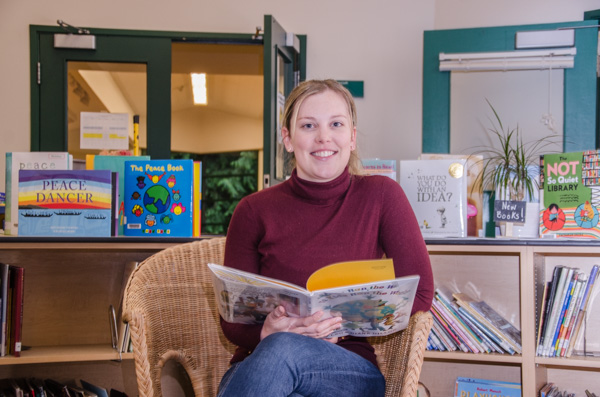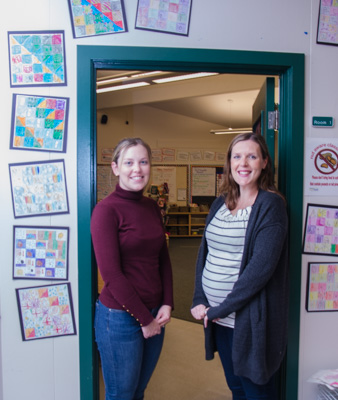Small steps lead to big changes
November 14, 2016 - 7 minutes read Brittany Johnson, who moved to Canada with her fiancé in 2014 from Australia’s Gold Coast, uses her skills in the classroom in a way she never could have where she was born.
Brittany Johnson, who moved to Canada with her fiancé in 2014 from Australia’s Gold Coast, uses her skills in the classroom in a way she never could have where she was born.
Trained in Applied Behavioural Analysis (ABA), Brittany provides support for a young girl with autism at Cypress Park primary school, and although she only started working for the district this past September, she’s built an enviable life here in Canada, and her daily contributions in the classroom provide vital support. Brittany first met her charge in the child’s own home prior to the start of the school year, as an important component of the child’s therapy.
“In Australia, public funding for children with disabilities in the classroom doesn’t exist like it does here,” says Brittany, who has Canadian citizenship through her father. “Families there pay for those services privately or enroll their children in fee-based private schools that serve children with disabilities.”
Following graduation, Brittany studied criminology and psychology at university, and began working in the justice system. While she was studying, she worked with kids in childcare, where she was able to observe certain behaviours in children that linked back to her studies in child psychology.
When she moved to the North Shore, where crime was less of an issue than it was in Australia, she decided to pursue a career working with children again, and began volunteering at a North Vancouver elementary school, shadowing education assistants who worked with Autism Spectrum Disorder (ASD). Her specialization choice made, she then studied with a Board Certified Behaviour Analyst to pursue certification.
ABA uses techniques and principles to bring about meaningful and positive changes in behaviour, which leads to better learning, more positive social interaction, and increased abilities in basic and more complex skills. One such technique is to ‘pre-load’ the child with information about what is happening and what will happen next, so that they know what to expect in a given situation.
“We break things into small steps, to pre-load an autistic child about what we’re about to do, using lots of visuals of what’s about to happen and what’s expected of them,” explains Brittany. “We work on routine sequences by prompting children verbally or using gestures, breaking a task down into very small steps. As therapists, over time we prompt them only when needed, and gradually, as they improve, we fade out our prompts until they can do these things on their own.”
Brittany says the process is similar for language development, as many autistic children are non-verbal when they enter school, and some are learning language as well as dealing with everything else that’s new in the first year of school.
As it is for every young student, communication between school and home is an important part of learning. Brittany communicates regularly in a notebook with the child’s parents, so that each has a starting point and current information about her emotional and physical state to provide the best care at home and at school.
“If I read that she’s not slept well, I proactively give her breaks or go to the calming corner so that she doesn’t feel overwhelmed,” says Brittany. “If she’s been off her appetite, I can offer her a snack. When she’s tired or otherwise frustrated, it blocks her ability to tell me what she wants.”
The focus for Brittany now is on increasing participation in the group more often.

Brittany Johnson with colleague Krista Koke, teacher.
“Sometimes the noise can be overwhelming for her, so I’ll do five minutes of this, a little math or inquiry, then some play and socialization. A lot of kids in her class are very curious, but everyone is understanding and all of them want to help her along.”
A number of special moments have already taken place in the brief time since she started her new role, the first such experience on the day she had an Individualized Education Planning (IEP) meeting with the child’s parents.
“I loved seeing her parents’ faces light up when I told them about a social interaction their daughter had with her peers,” says Brittany. “It’s also been really rewarding to see her build rapport with me and become more social with her peers – it’s great to see how her face lights up and how happy it makes her, since she’s naturally drawn to adults.”
Brittany says there’s no comparison to the excellence of education in BC, and she’s thinking about delving more deeply into a teaching role through special education. She’s also very impressed with the school community, and says parents are an important part of the school’s culture.
“Cypress Park is very parent-focussed and inclusive. It’s like a small family and the IB program is fantastic – encouraging kids to think for themselves and question things – it offers families fantastic programs and great teachers.”
Brittany, who hopes to start her own family and pursue a Master’s degree, lives with her fiancé, a travel agent, and two beloved dogs who moved with them from Australia, in North Vancouver. Although still at the beginning of her career, she has already travelled to 47 different countries. When she’s not travelling, working or cuddling with her dogs, she can be found reading, hiking or eagerly snagging any beach time she can.